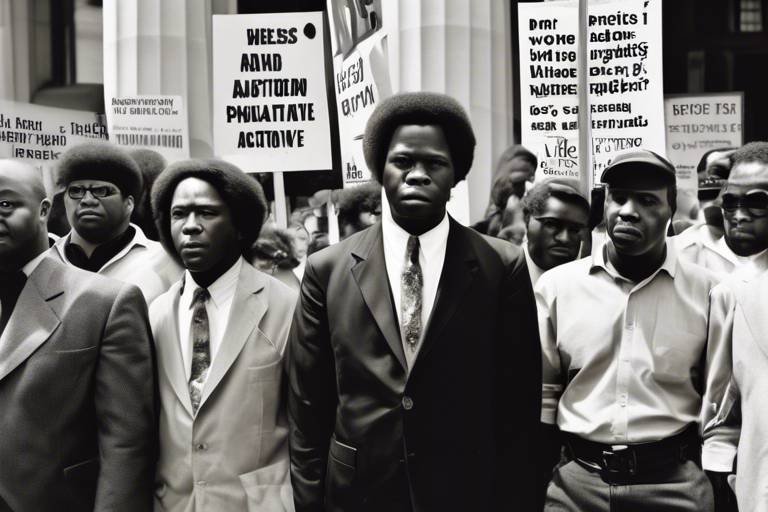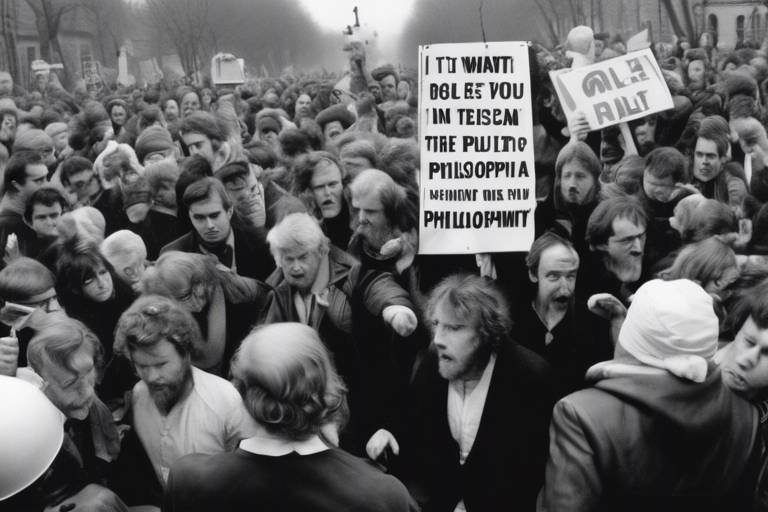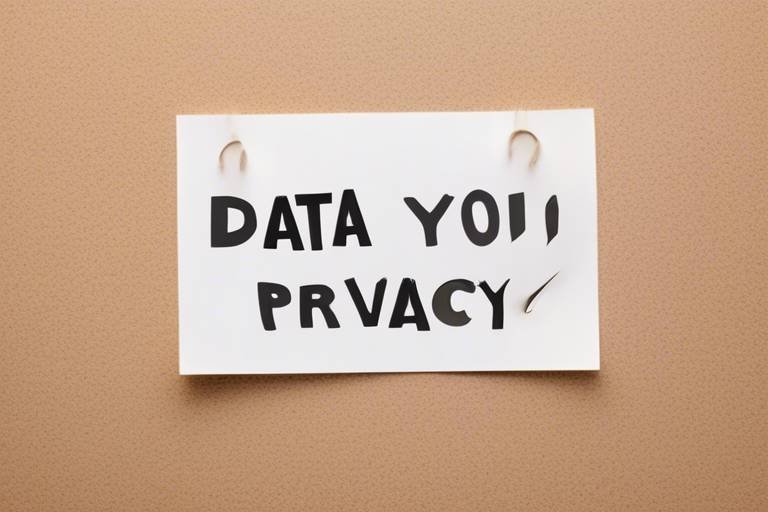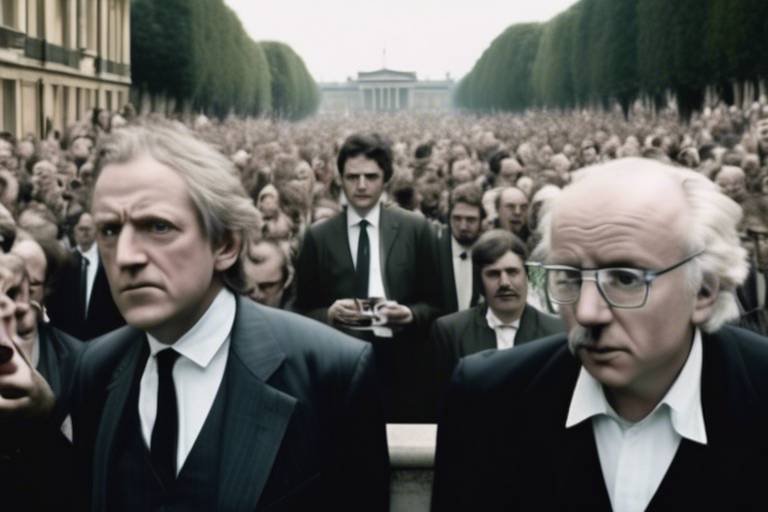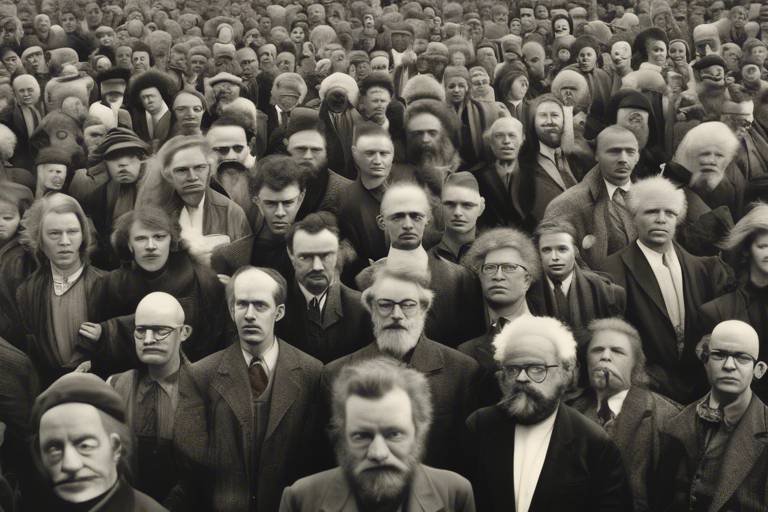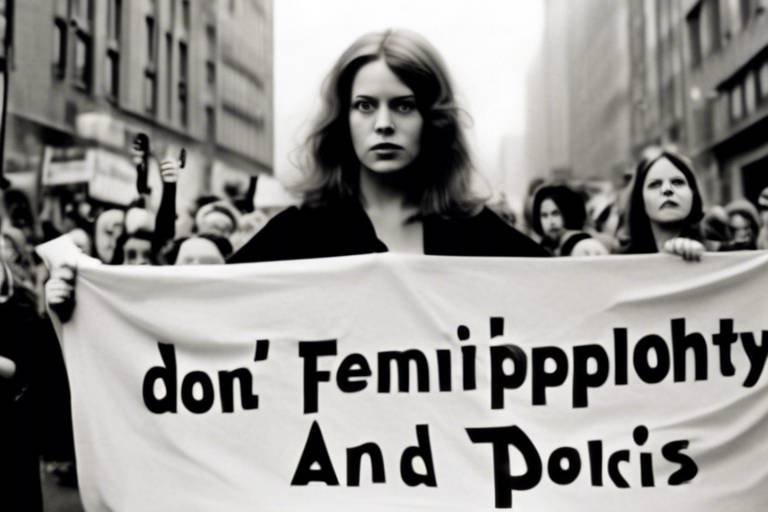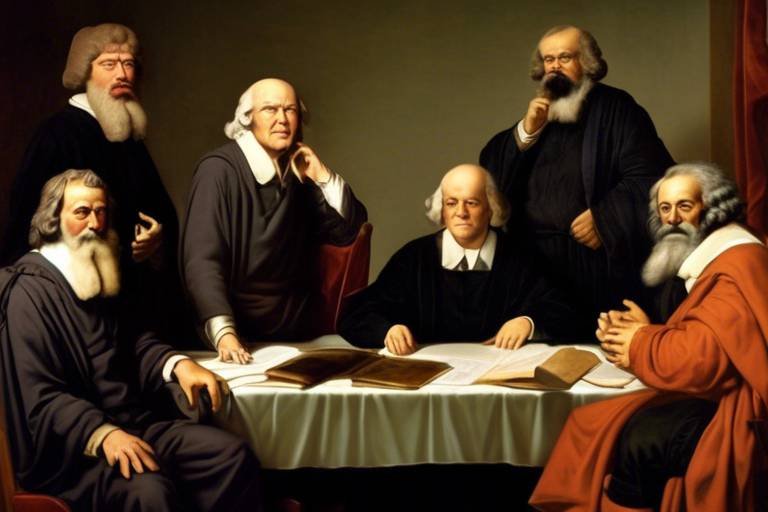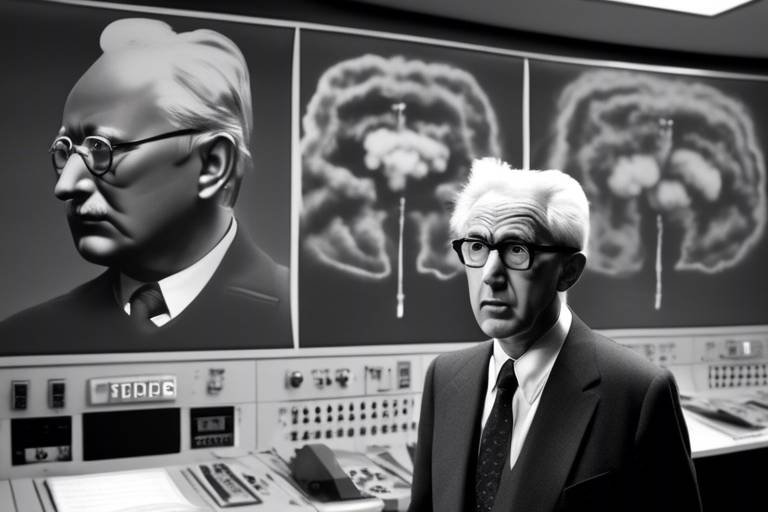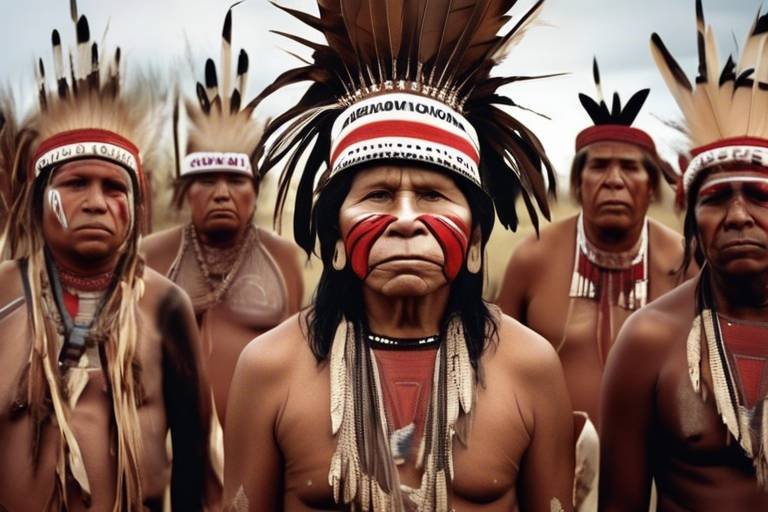The Philosophy of Democracy - Gifting Power to the People
Democracy is often heralded as the gold standard of governance, a system that champions the voice of the individual while simultaneously weaving a fabric of collective will. But what does it truly mean to gift power to the people? At its core, democracy is more than just a method of governance; it’s a philosophy rooted in the belief that every individual possesses inherent worth and the right to participate in the decisions that shape their lives. This article explores the fundamental concepts of democracy, its philosophical underpinnings, and the implications of empowering individuals in society. We will delve into various aspects that shape democratic governance, revealing the intricate dance between individual rights and collective responsibility.
To understand the philosophy of democracy, we must first journey back in time to its historical roots. The seeds of democratic thought were sown in ancient Greece, where philosophers like Plato and Aristotle began to ponder the role of citizens in governance. However, it was the city-state of Athens that truly embodied the principles of democracy, allowing free male citizens to participate directly in decision-making. Fast forward to the Enlightenment, where thinkers such as John Locke and Jean-Jacques Rousseau expanded on these ideas, advocating for individual rights and the social contract. Their writings laid the groundwork for modern democratic systems, illustrating how power dynamics have evolved over time and how the concept of governance shifted from the hands of a few to the collective will of many.
Individual rights are the bedrock of any democratic society. They serve not only as a shield for personal freedom but also as a framework for ensuring equality and protecting minorities. In a democracy, the **voice of the majority** must never drown out the rights of the minority. This delicate balance is crucial; without it, democracy risks devolving into tyranny. Rights such as freedom of speech, assembly, and religion empower individuals to express their opinions and challenge injustices. Imagine a world where your voice matters, where your thoughts can spark change. This is the essence of democracy—an ongoing dialogue between the individual and the state, where every person has a stake in the governance of their community.
At the heart of democratic philosophy lies the social contract theory, a concept that posits an implicit agreement between citizens and their government. This theory suggests that individuals consent to give up some freedoms in exchange for the protection of their remaining rights. Think of it as a dance: citizens entrust their leaders with power, expecting them to act in the public's best interest. This relationship is not one-sided; it comes with moral obligations. If the government fails to uphold its end of the bargain, citizens have the right to demand change. This dynamic ensures that democracy remains a living, breathing entity, responsive to the needs and desires of its people.
The debate between Thomas Hobbes and John Locke presents two contrasting views on human nature and governance. Hobbes, in his work "Leviathan," argued that humans are inherently selfish and require a strong, centralized authority to maintain order. In contrast, Locke believed that individuals are rational and capable of self-governance, advocating for a government that derives its power from the consent of the governed. This philosophical clash has significantly influenced modern democratic principles, shaping the balance of power between the state and individuals. While Hobbes saw democracy as a potential chaos, Locke viewed it as a pathway to personal freedom and societal progress.
Rousseau introduced the idea of the general will, emphasizing the importance of collective decision-making. He argued that true democracy requires citizens to prioritize the common good over individual desires. This concept raises intriguing questions: Can we truly balance personal interests with the needs of the community? How do we ensure that the general will reflects the diverse voices within society? Rousseau’s philosophy challenges us to think critically about our responsibilities as citizens and the ways in which we can contribute to a more equitable society.
Participatory democracy takes the notion of citizen engagement a step further by advocating for active involvement in political processes. It’s not just about casting a vote every few years; it’s about creating opportunities for citizens to engage in dialogue, influence decision-making, and hold their representatives accountable. This approach enhances representation and fosters a sense of ownership among citizens. Imagine attending town hall meetings, voicing your concerns, and seeing tangible changes in your community as a result. Participatory democracy transforms passive citizens into active participants, breathing life into the democratic process.
Despite its ideals, democracy faces numerous challenges that threaten its integrity. Political polarization, misinformation, and the influence of money in politics create a landscape where informed decision-making becomes increasingly difficult. These issues can lead to a disillusioned electorate, where citizens feel their voices are drowned out by powerful interests. The question arises: how do we safeguard democracy in an age of division and deceit? Addressing these challenges requires vigilance, education, and a commitment to fostering an informed citizenry.
Voter apathy is a significant hurdle in democratic societies. Many individuals feel disenchanted with the political process, believing their votes don’t matter or that the system is rigged against them. To combat this, we must explore the underlying factors contributing to low electoral participation. Strategies such as civic education, community outreach, and simplifying the voting process can enhance engagement. It’s essential to remind citizens that their voices matter; every vote is a step toward shaping the future of their communities.
Democracy is not a one-size-fits-all model; it varies across cultures and nations. By examining different democratic practices, we can gain insights into how local contexts shape experiences and challenges. For instance, while some democracies thrive on robust civic engagement, others struggle with authoritarian tendencies. Understanding these global perspectives enriches our appreciation of democracy and highlights the universal challenges faced by democratic systems worldwide.
As we look to the future, the trajectory of democracy is both exciting and uncertain. Emerging trends such as digital governance and global cooperation present new opportunities for citizen engagement and collaboration. However, they also pose challenges that require careful consideration. The potential for new democratic models, driven by technology and innovation, could reshape how we think about governance. Will we embrace these changes, or will we cling to outdated notions of power? The future of democracy lies in our hands, and it is up to us to ensure it evolves in a way that reflects our shared values and aspirations.
- What is the essence of democracy? Democracy is fundamentally about empowering individuals to participate in decision-making processes that affect their lives.
- How do individual rights support democracy? Individual rights ensure personal freedom and protect minorities, maintaining a balance between the majority's will and the rights of the few.
- What is participatory democracy? Participatory democracy emphasizes active citizen engagement in political processes beyond just voting, fostering accountability and representation.
- What challenges does democracy face today? Challenges include political polarization, misinformation, and voter apathy, all of which threaten the integrity of democratic systems.
- How can we enhance voter engagement? Strategies such as civic education, community outreach, and simplifying voting processes can help increase voter participation.

The Historical Roots of Democracy
When we think about democracy today, it’s easy to take for granted the principles of freedom and equality that underpin it. However, the historical roots of democracy are deeply intertwined with the thoughts and actions of several key philosophers and pivotal moments in history. To truly appreciate modern democratic systems, we must journey back to ancient times, where the seeds of democratic thought were sown.
The concept of democracy can be traced back to ancient Greece, particularly in the city-state of Athens around the 5th century BCE. Here, citizens participated directly in decision-making, a radical shift from the autocratic rule that had dominated prior societies. This early form of democracy was not without its flaws, as it excluded women, slaves, and non-citizens. Nonetheless, it set the stage for future developments in democratic governance.
Fast forward to the Enlightenment era, where philosophers like John Locke and Thomas Hobbes began to articulate ideas that would shape modern democracy. Locke's belief in the social contract theory emphasized that governments derive their authority from the consent of the governed. This idea was revolutionary and laid the groundwork for the notion that individuals have inherent rights that must be protected by their government.
In contrast, Hobbes had a more pessimistic view of human nature, arguing that without a strong, centralized authority, society would descend into chaos. His work, "Leviathan," painted a picture of a powerful sovereign necessary to maintain order. This clash of ideas between Hobbes and Locke highlights the ongoing debate about the balance of power between the state and the individual, a discussion that remains relevant today.
Another pivotal figure in the evolution of democratic thought was Jean-Jacques Rousseau. His concept of the general will introduced the idea that true democracy requires collective decision-making that reflects the common good rather than individual desires. Rousseau's writings emphasized the importance of civic participation and the need for citizens to engage actively in the political process, a principle that resonates strongly in contemporary discussions about participatory democracy.
As we examine these historical roots, it’s essential to recognize that democracy is not a static concept; it has evolved through various struggles and revolutions. The American Revolution and the French Revolution were significant milestones that challenged traditional power structures and championed the rights of individuals. These revolutions not only inspired nations but also ignited a global conversation about the nature of governance and the rights of citizens.
In summary, the historical roots of democracy are a rich tapestry woven from the ideas of influential thinkers and the actions of courageous individuals. From ancient Athens to the Enlightenment and beyond, the journey toward empowering the people has been fraught with challenges and triumphs. Understanding this history is crucial as we navigate the complexities of democracy today.
- What is the origin of democracy? Democracy originated in ancient Greece, particularly in Athens, where citizens participated directly in governance.
- Who were the key philosophers that influenced democracy? Key philosophers include John Locke, Thomas Hobbes, and Jean-Jacques Rousseau, each contributing unique perspectives on governance and individual rights.
- How did the American and French Revolutions impact democracy? Both revolutions challenged traditional power structures and advocated for individual rights, significantly shaping modern democratic principles.

The Role of Individual Rights
The essence of a democracy rests on the foundation of individual rights. These rights are not just privileges; they are the very fabric that upholds personal freedom and equality within a society. When we talk about democracy, we often think of voting and governance, but at its core, democracy is about empowering individuals. It's about ensuring that every voice matters and that each person has the ability to express their beliefs without fear of persecution. Imagine a world where your thoughts were stifled, where your right to speak out was suppressed—this is the stark reality in non-democratic regimes.
Individual rights serve a dual purpose in a democracy: they protect the minorities and ensure that the majority cannot trample over the rights of the less powerful. It’s like a safety net that catches those who might fall through the cracks of societal norms. For instance, consider the freedom of speech. This right allows individuals to articulate dissenting opinions, challenge the status quo, and advocate for change. Without such a right, progress becomes stagnant, and society risks devolving into a state of complacency.
Furthermore, the significance of individual rights can be illustrated through the following key elements:
- Personal Freedom: The ability to live one's life without undue interference.
- Equality: Ensuring that everyone has the same rights and opportunities.
- Protection of Minorities: Safeguarding the interests of those who may not be represented by the majority.
It's essential to recognize that these rights are not absolute; they come with responsibilities. In a democratic society, the rights of an individual must be balanced against the rights of others. This creates a dynamic interplay where dialogue and compromise are necessary. Think of it as a dance where each partner must be aware of the other's movements to avoid stepping on toes. The delicate balance of rights ensures that no one person or group dominates the conversation, fostering a culture of respect and understanding.
Moreover, the protection of individual rights is enshrined in various democratic constitutions around the world. These legal frameworks serve as a guiding light, reminding both the government and the citizens of their obligations. For example, the Universal Declaration of Human Rights articulates fundamental rights that everyone is entitled to, regardless of nationality, ethnicity, or religion. This declaration acts as a moral compass, steering nations towards a more just and equitable society.
In conclusion, the role of individual rights in a democracy cannot be overstated. They are the bedrock upon which democratic societies are built. By ensuring that each person has the freedom to express themselves, the right to participate in governance, and the protection of their fundamental liberties, democracies can flourish. However, it’s a continuous journey—one that requires vigilance, education, and active participation from all citizens to uphold these rights and ensure that they are not eroded over time.
Q1: What are individual rights?
A: Individual rights are the liberties and freedoms that belong to each person, protecting them from infringement by the government or other individuals.
Q2: Why are individual rights important in a democracy?
A: They ensure that every citizen has a voice, protects minorities from the majority's will, and upholds personal freedoms essential for a vibrant society.
Q3: How are individual rights protected?
A: Individual rights are typically protected by laws and constitutions, which outline the fundamental rights of citizens and the limits of governmental power.

The Social Contract Theory
The social contract theory is a compelling framework that helps us understand the relationship between individuals and their government. Imagine a time when there were no laws, no governance, and people lived in a state of nature. In this chaotic environment, individuals were driven by their instincts and desires, often leading to conflict and strife. To escape this turmoil, people began to form agreements—social contracts—that would govern their interactions and establish order. This concept, which has been discussed by several key philosophers, forms the bedrock of democratic legitimacy.
At its core, the social contract theory posits that individuals consent, either explicitly or implicitly, to surrender some of their freedoms and submit to the authority of a governing body in exchange for protection of their remaining rights. This mutual agreement is what legitimizes the power of the state. Think of it as a trade-off: you give up a bit of your autonomy, and in return, you gain security and the assurance that your rights will be upheld. This relationship creates a moral obligation for the government to act in the best interests of its citizens, ensuring that the power is not wielded arbitrarily but rather for the common good.
Different philosophers have approached the social contract from unique perspectives, leading to a rich tapestry of thought. For instance, Thomas Hobbes viewed the state of nature as a perilous place where life was "solitary, poor, nasty, brutish, and short." He argued that to avoid chaos, individuals must submit to a powerful sovereign. In contrast, John Locke believed that while individuals should surrender some freedoms, they retain certain inalienable rights, such as life, liberty, and property. Locke's ideas laid the groundwork for modern democracy by emphasizing the importance of individual rights and the government’s responsibility to protect them.
Another significant contributor to social contract theory is Jean-Jacques Rousseau, who introduced the concept of the "general will." Rousseau argued that true freedom is found not in individual pursuits but in collective decision-making that reflects the common good. His ideas challenge us to consider how individual desires can sometimes conflict with societal needs, and how a balance must be struck to achieve a harmonious democratic society.
In summary, the social contract theory is not just an abstract philosophical idea; it has real-world implications for how we perceive power and governance. It raises critical questions like: What is the role of the government? How much freedom are we willing to give up for security? And, importantly, how can we ensure that our government remains accountable to us, the governed? These questions are at the heart of democratic discourse and continue to shape our political landscape today.
- What is the social contract theory? - It is a philosophical concept that explains the relationship between individuals and their government based on mutual agreement and consent.
- Who are the key philosophers associated with social contract theory? - The most notable figures include Thomas Hobbes, John Locke, and Jean-Jacques Rousseau, each offering unique perspectives on governance and individual rights.
- How does social contract theory apply to modern democracy? - It underscores the importance of citizen consent and the government's obligation to protect individual rights, forming the foundation of democratic legitimacy.
- What are the implications of social contract theory for individual freedoms? - It highlights the balance between individual liberties and the need for collective governance, prompting discussions about the limits of state power.

Hobbes vs. Locke
When it comes to the philosophical foundations of democracy, few debates are as pivotal as the contrasting views of Thomas Hobbes and John Locke. Both thinkers grappled with the nature of human beings and the role of government, yet they arrived at remarkably different conclusions that have shaped political thought for centuries. Hobbes, in his seminal work Leviathan, painted a rather bleak picture of humanity. He believed that in the state of nature, life would be "solitary, poor, nasty, brutish, and short." For Hobbes, the innate selfishness and aggression of individuals necessitated a strong, centralized authority to maintain order and prevent chaos. This led him to advocate for an absolute monarchy, where the sovereign holds ultimate power, ensuring peace and stability.
On the other hand, Locke offered a more optimistic view of human nature. In his work Two Treatises of Government, Locke argued that individuals are inherently rational and capable of self-governance. He posited that the state of nature is characterized by a state of equality and freedom, where people possess natural rights to life, liberty, and property. Locke believed that governments are established through the consent of the governed and must protect these rights. If a government fails to do so, citizens have the right to revolt. This idea of governance based on consent and the protection of individual rights laid the groundwork for modern democratic principles.
The differences between Hobbes and Locke can be summarized in the following table:
| Aspect | Hobbes | Locke |
|---|---|---|
| View of Human Nature | Pessimistic; humans are selfish and aggressive | Optimistic; humans are rational and cooperative |
| State of Nature | Chaotic and violent | Equal and free |
| Government Type | Absolute monarchy | Representative government |
| Social Contract | Citizens surrender rights for order | Citizens consent to protect rights |
This philosophical divide has profound implications for how we understand democracy today. Hobbes’ emphasis on a powerful sovereign has been interpreted by some as a justification for authoritarian regimes, while Locke’s ideas have inspired countless democratic movements advocating for individual rights and government accountability. The ongoing dialogue between these two perspectives continues to influence our political landscape, reminding us that the balance of power between the state and the individual is a cornerstone of democratic governance.
Q: What are the main differences between Hobbes and Locke's views on human nature?
A: Hobbes viewed human nature as inherently selfish and aggressive, leading to a need for a strong, centralized authority. In contrast, Locke believed humans are rational and capable of self-governance, advocating for a government that protects individual rights.
Q: How do Hobbes and Locke's ideas influence modern democracy?
A: Hobbes’ ideas can be seen in arguments for strong government authority, while Locke’s principles underpin modern democratic ideals such as individual rights, consent of the governed, and the right to revolt against unjust governments.

Rousseau’s Concept of General Will
When we dive into the philosophical waters of Jean-Jacques Rousseau, we encounter a fascinating concept known as the General Will. This idea is not just a philosophical abstraction; it represents a powerful force that aims to unify the desires and aspirations of the community. Rousseau believed that true democracy arises when individuals come together to form a collective will that transcends personal interests. In his view, the General Will is the embodiment of the common good, reflecting what is best for society as a whole rather than just for a select few.
Imagine a bustling marketplace where every vendor shouts to promote their goods. Each voice is distinct, clamoring for attention. However, amidst this cacophony, there lies an underlying harmony—an unspoken agreement about what the community needs. This is similar to Rousseau's idea of the General Will, where individual desires harmonize into a collective decision that benefits everyone. The challenge, however, lies in distinguishing between the General Will and the will of all, which merely aggregates individual preferences without considering the common good.
Rousseau argued that the General Will is not merely the sum of all individual wills. Instead, it requires a level of civic virtue and moral commitment from citizens. To truly participate in the General Will, individuals must be willing to set aside their personal interests and consider the welfare of the community. This brings us to a crucial point: the tension between individual desires and collective needs. How do we ensure that individual voices are heard while still promoting the common good?
Rousseau's vision of democracy emphasizes participation and engagement. He believed that citizens should actively contribute to the decision-making process, as this engagement fosters a sense of ownership and responsibility towards the community. In this light, the General Will is not static; it evolves as the community grows and changes. To illustrate this dynamic, we can consider the following aspects:
- Collective Decision-Making: The General Will is formed through discussions, debates, and consensus-building among citizens.
- Social Cohesion: It fosters a strong sense of belonging and unity, encouraging individuals to work together towards common goals.
- Accountability: By participating in the General Will, citizens hold each other accountable, ensuring that decisions reflect the community's best interests.
In conclusion, Rousseau’s concept of the General Will serves as a cornerstone for understanding democratic governance. It challenges us to think critically about our roles as citizens and the importance of our contributions to the collective. Are we merely voicing our individual preferences, or are we striving to understand and promote the common good? This question remains ever-relevant in our contemporary society, where the balance between personal freedom and collective responsibility is constantly negotiated.
- What is the General Will? The General Will refers to the collective interest of the community, transcending individual desires to promote the common good.
- How does Rousseau differentiate between the General Will and the will of all? The General Will aims at the common good, while the will of all is merely the sum of individual preferences.
- Why is civic engagement important in Rousseau’s philosophy? Civic engagement ensures that individuals contribute to the General Will, fostering accountability and a sense of community.

Participatory Democracy
Participatory democracy is more than just a buzzword; it’s a vibrant philosophy that encourages citizens to take an active role in shaping the policies that govern their lives. Imagine a world where every voice is heard, where ordinary people can directly influence decisions that affect their communities. This concept challenges the traditional notion of democracy, which often relegates citizens to mere voters every few years. Instead, participatory democracy fosters an environment where engagement is continuous and dynamic.
At its core, participatory democracy emphasizes that governance should not be an exclusive club for politicians and elites. It invites everyone to the table, ensuring that diverse perspectives are considered. This inclusivity is crucial for a healthy democracy, as it helps to bridge the gap between the government and the governed. When citizens actively participate, they not only hold their leaders accountable but also contribute to a richer, more informed decision-making process.
One of the most compelling aspects of participatory democracy is the variety of ways citizens can engage. From town hall meetings to online platforms where people can discuss and vote on local issues, the options are plentiful. Here are some common methods:
- Deliberative Polling: This method combines surveys with discussions, allowing citizens to weigh in on issues after being informed about the topic.
- Participatory Budgeting: Citizens decide how to allocate a portion of the public budget, directly impacting community projects and services.
- Citizen Assemblies: A randomly selected group of citizens comes together to deliberate on important issues, providing recommendations to policymakers.
These methods not only empower individuals but also cultivate a sense of community. When people come together to discuss their needs and aspirations, they build relationships that transcend political divides. This communal spirit is essential in today’s polarized environment, where finding common ground can often feel like an uphill battle.
However, participatory democracy is not without its challenges. For instance, the effectiveness of these initiatives can be hampered by factors such as misinformation, lack of access to technology, or even apathy. To truly harness the power of participatory democracy, it’s crucial to address these barriers head-on. Educational programs that inform citizens about their rights and responsibilities, as well as initiatives that promote digital literacy, can significantly enhance participation.
In conclusion, participatory democracy represents a powerful shift towards a more engaged citizenry. By embracing this model, societies can cultivate a political culture that values dialogue, inclusivity, and community involvement. As we move forward, it’s essential to continue exploring innovative ways to enhance citizen participation, ensuring that democracy is not just a system of governance, but a way of life.
Q: What is participatory democracy?
A: Participatory democracy is a political philosophy that emphasizes active citizen engagement in decision-making processes, allowing individuals to have a direct say in governance.
Q: How can citizens participate in participatory democracy?
A: Citizens can engage through various methods such as deliberative polling, participatory budgeting, and citizen assemblies, among others.
Q: What are the benefits of participatory democracy?
A: Benefits include increased accountability, enhanced community relationships, and more informed decision-making that reflects the diverse needs of the population.
Q: What challenges does participatory democracy face?
A: Challenges include misinformation, digital divides, and voter apathy, which can hinder effective participation.

The Challenges of Democracy
Democracy, while often hailed as the gold standard of governance, is not without its challenges. In fact, the very essence of democracy is constantly tested by a myriad of obstacles that can undermine its foundational principles. One of the most pressing issues is political polarization. In recent years, we've seen a dramatic increase in divisions among political parties and within the electorate itself. This polarization can lead to a toxic environment where constructive dialogue is replaced with hostility, making it increasingly difficult to find common ground on critical issues.
Another significant challenge is the spread of misinformation. In our digital age, where information is just a click away, distinguishing between fact and fiction has become a Herculean task. Misinformation can skew public perception, manipulate voter behavior, and ultimately erode trust in democratic institutions. When citizens are misled, the very foundation of informed decision-making crumbles, leading to a populace that may be voting based on false premises.
Moreover, the influence of money in politics cannot be overlooked. The role that wealthy donors and corporations play in shaping policy and political outcomes raises questions about the integrity of democratic processes. When a handful of individuals or entities hold disproportionate power, the voices of ordinary citizens can be drowned out. This creates a system where the interests of the few overshadow the needs of the many, fostering disillusionment and disengagement among the electorate.
To illustrate these challenges, consider the following table that summarizes some of the most critical issues facing democracies today:
| Challenge | Description |
|---|---|
| Political Polarization | Increasing divisions among political parties and the electorate, leading to hostility and a lack of constructive dialogue. |
| Misinformation | The spread of false information that can manipulate public perception and undermine trust in democratic institutions. |
| Money in Politics | The disproportionate influence of wealthy donors and corporations on policy and political outcomes, overshadowing the needs of ordinary citizens. |
These challenges are not just abstract concepts; they have real-world implications that affect the way citizens engage with their governments. For example, voter apathy often stems from a feeling of powerlessness in the face of these overwhelming challenges. When people feel that their votes do not count or that their voices are not heard, they are less likely to participate in the electoral process. This disengagement creates a vicious cycle where low participation rates further weaken the democratic system.
Furthermore, the global perspective on democracy reveals that these challenges are not confined to any one nation. Across the globe, democracies are grappling with similar issues, albeit in different contexts. Understanding how local cultures and histories shape democratic experiences can provide valuable insights into potential solutions. For instance, some countries have implemented innovative approaches to enhance civic engagement and counter misinformation, demonstrating that while the challenges are significant, they are not insurmountable.
In conclusion, the challenges of democracy are complex and multifaceted, requiring a concerted effort from citizens, leaders, and institutions alike to address them. As we navigate these turbulent waters, it is crucial to remain vigilant and proactive in safeguarding the values that underpin democratic governance. Only then can we hope to create a more inclusive, informed, and engaged society.
- What is political polarization? Political polarization refers to the growing divide between political parties and ideologies, leading to increased hostility and reduced willingness to compromise.
- How does misinformation impact democracy? Misinformation can distort public perception and decision-making, undermining trust in democratic institutions and leading to uninformed voting.
- What role does money play in politics? Money can significantly influence political outcomes by allowing wealthy individuals and corporations to exert disproportionate control over policy and governance.
- How can voter apathy be addressed? Encouraging civic engagement through education, outreach, and accessible voting processes can help combat voter apathy and increase participation.

Voter Apathy and Engagement
Voter apathy is like a quiet storm brewing beneath the surface of a vibrant democracy. It’s the phenomenon where citizens, despite having the right to vote, choose to abstain from participating in elections. This disengagement can stem from various factors, including disillusionment with the political process, lack of information, or simply feeling that their vote doesn’t matter. Imagine a bustling marketplace where everyone is invited to trade their ideas and opinions, but only a handful of people show up. This scenario reflects the current state of many democracies, where a significant portion of the population remains silent.
One primary reason for voter apathy is the overwhelming sense of disconnection from political representatives. Many citizens feel that their voices are drowned out by the louder, more organized groups with financial backing. This leads to a perception that elections are merely a formality, where the outcome is predetermined by those with power and resources. The irony is that while people may feel powerless, they hold the key to change in their hands—if only they would use it. To combat this, we must understand the underlying causes of apathy and actively work to foster a culture of engagement.
To tackle voter apathy, it’s essential to implement strategies that encourage civic engagement. Here are some effective approaches:
- Education and Awareness: Providing accessible information about the electoral process and the significance of voting can empower citizens. Workshops, community meetings, and online resources can demystify the voting process.
- Community Involvement: Encouraging local organizations to host events that promote political discussions can help bridge the gap between citizens and their representatives. When people feel connected to their community, they are more likely to participate in elections.
- Utilizing Technology: In today’s digital age, leveraging social media and online platforms can facilitate easier access to information and mobilization efforts. Campaigns that engage younger voters through platforms they frequent can significantly boost participation.
Moreover, addressing the emotional aspect of voting is crucial. Many individuals experience a sense of hopelessness or believe that their vote won’t lead to real change. This mindset can be shifted by highlighting success stories where grassroots movements have made a tangible difference in local communities. When citizens see the impact of collective action, it can reignite their passion for participation.
In conclusion, combating voter apathy is not just about increasing numbers at the polls; it’s about nurturing a vibrant democratic culture where every voice matters. By fostering engagement through education, community involvement, and the use of technology, we can create a more inclusive political landscape. It’s time for citizens to rise, shake off the apathy, and realize that their vote is a powerful tool for change.
Q: What is voter apathy?
A: Voter apathy refers to the lack of interest or motivation among eligible voters to participate in elections, often leading to lower voter turnout.
Q: What causes voter apathy?
A: Factors contributing to voter apathy include disillusionment with the political process, lack of information about candidates and issues, and feelings of powerlessness.
Q: How can we encourage more people to vote?
A: Strategies such as increasing education about the electoral process, fostering community involvement, and utilizing technology to engage younger voters can help boost participation.
Q: Why is voting important?
A: Voting is a fundamental right in a democracy that allows citizens to express their opinions, influence government policies, and hold elected officials accountable.

Global Perspectives on Democracy
When we think about democracy, it's easy to picture a single model, often influenced by Western ideals. However, democracy is a multifaceted concept that varies significantly across the globe. Each nation adapts democratic principles to fit its unique cultural, historical, and social context. For instance, while the United States champions a representative democracy, countries like Switzerland showcase a model of direct democracy where citizens have a direct say in legislation through referendums. This divergence raises an intriguing question: What does democracy truly mean in different parts of the world?
In regions like Africa, democracy is often intertwined with the challenges of governance and development. Many African nations have experienced a tumultuous journey toward democracy, marked by colonial legacies and authoritarian regimes. Yet, there is a growing trend of democratic resilience as citizens demand accountability and transparency from their leaders. Countries such as Ghana and Botswana have emerged as beacons of democratic governance, demonstrating that the quest for democracy can thrive even in challenging environments.
Asia presents another fascinating landscape for democracy. Nations like India, the world's largest democracy, showcase the complexities of managing a diverse population with numerous languages, religions, and cultures. The Indian model emphasizes the importance of individual rights and freedoms, yet it also faces challenges such as political corruption and social inequality. How do these factors impact the democratic process? Understanding the interplay between culture and democracy is crucial. In contrast, countries like China operate under a different paradigm, prioritizing stability and economic growth over democratic freedoms, leading to a debate on whether economic success can coexist with limited political rights.
Europe, with its historical legacy of democratic thought, presents a mixed bag of democratic experiences. While Western European nations generally enjoy stable democracies, Eastern Europe grapples with the remnants of authoritarian rule. The rise of populism in both regions raises concerns about the future of democratic values. Are we witnessing a regression in democracy? The answer may lie in how citizens respond to the challenges posed by misinformation and political polarization. The European Union itself faces internal challenges, with member states exhibiting varying degrees of commitment to democratic principles.
To illustrate these diverse perspectives, consider the following table that highlights key democratic features in different regions:
| Region | Key Features | Challenges |
|---|---|---|
| Africa | Emerging democracies, citizen activism | Corruption, political instability |
| Asia | Diverse electoral systems, varying rights | Authoritarianism, social inequality |
| Europe | Stable democracies, EU governance | Populism, nationalism |
In conclusion, the global perspectives on democracy reveal that there is no one-size-fits-all approach. Each country navigates its path, influenced by its history, culture, and the aspirations of its people. As we ponder the future of democracy, it's essential to recognize and appreciate these differences while advocating for the core principles of freedom, equality, and justice that unite us all.
- What are the main types of democracy? There are several types, including direct democracy, representative democracy, and participatory democracy.
- Why is democracy important? Democracy empowers individuals, promotes equality, and protects human rights.
- How does culture affect democracy? Cultural norms and values shape how democratic principles are interpreted and practiced in different societies.
- What challenges do democracies face today? Challenges include political polarization, misinformation, and the influence of money in politics.

The Future of Democracy
As we stand on the brink of a new era, the future of democracy is an exhilarating yet daunting prospect. The rapid evolution of technology, shifting societal values, and the increasing interconnectedness of our world are reshaping the landscape of democratic governance. Have you ever wondered how these changes will impact our political systems? Will democracy adapt to the digital age, or will it face challenges that threaten its very existence?
One of the most significant trends we see emerging is digital governance. With the rise of the internet and social media, citizens now have unprecedented access to information and a platform to voice their opinions. This digital revolution can empower individuals, allowing them to engage in political discourse like never before. However, this power comes with its own set of challenges. Misinformation spreads like wildfire online, making it crucial for citizens to develop critical thinking skills to discern fact from fiction. In a world where a tweet can spark a global movement, how can we ensure that our democratic processes remain intact?
Another critical aspect of the future of democracy is global cooperation. As nations grapple with transnational issues such as climate change, economic inequality, and public health crises, collaboration becomes essential. No longer can countries operate in isolation; the challenges we face are too complex for any one nation to tackle alone. This interconnectedness may lead to new forms of governance that transcend traditional borders, fostering a more inclusive and representative political landscape. Imagine a world where policies are crafted not just by national leaders but also through international coalitions that prioritize the common good.
Moreover, we must consider the potential for new democratic models. As we witness the failures and successes of existing systems, innovative approaches are being tested around the globe. Participatory budgeting, deliberative democracy, and citizen assemblies are just a few examples of how communities are reimagining governance. These models emphasize inclusivity and direct citizen involvement, challenging the notion that democracy must be confined to the ballot box. Could these new frameworks provide the antidote to voter apathy and disengagement?
| Emerging Trends | Potential Impacts |
|---|---|
| Digital Governance | Increased citizen engagement but higher risk of misinformation |
| Global Cooperation | Enhanced problem-solving for transnational issues |
| New Democratic Models | Greater inclusivity and participation in decision-making |
Ultimately, the future of democracy hinges on our ability to adapt and innovate. It's a journey that requires us to remain vigilant and proactive. As citizens, we must engage in the political process, advocate for transparency, and hold our leaders accountable. The question remains: are we ready to embrace the changes that lie ahead?
- What role does technology play in the future of democracy?
Technology can enhance citizen engagement but also poses challenges like misinformation. - How can we ensure global cooperation in democratic processes?
By fostering international coalitions and prioritizing collaborative solutions to global issues. - What are some examples of new democratic models?
Participatory budgeting and citizen assemblies are innovative approaches gaining traction.
Frequently Asked Questions
- What is the essence of democracy?
Democracy is fundamentally about empowering individuals to have a voice in their governance. It's the idea that power should rest with the people, allowing them to influence decisions that affect their lives. Think of it as a collective journey where everyone has a say in the direction we take as a society.
- How did democracy evolve over time?
The evolution of democracy can be traced back to ancient civilizations, notably in Greece, where philosophers like Socrates and Plato laid the groundwork. Over centuries, various events and thinkers, including Hobbes and Locke, shaped the way we understand and practice democratic governance today, adapting it to fit the needs of changing societies.
- What role do individual rights play in a democracy?
Individual rights are the backbone of a democratic society. They ensure that everyone is treated equally and that minority voices are heard. Without these rights, democracy would struggle to function effectively, as it would lack the protection and respect necessary for personal freedoms.
- What is the social contract theory?
The social contract theory posits that individuals consent to form a society and accept certain obligations to maintain order. This relationship between citizens and their government is crucial for establishing democratic legitimacy, as it outlines the responsibilities both parties have towards each other.
- How do Hobbes and Locke differ in their views on governance?
Hobbes viewed humans as inherently self-interested and believed in a strong, centralized authority to maintain order. In contrast, Locke had a more optimistic view of human nature, advocating for a government that protects individual rights and promotes freedom. Their differing perspectives have significantly influenced modern democratic thought.
- What is participatory democracy?
Participatory democracy emphasizes the active involvement of citizens in political processes. It encourages individuals to engage in decision-making, fostering a sense of community and accountability. This approach not only enhances representation but also strengthens the democratic fabric of society.
- What challenges do democracies face today?
Democracies today grapple with issues like political polarization, misinformation, and the overwhelming influence of money in politics. These challenges can undermine the integrity of democratic systems, making it essential for citizens to remain vigilant and engaged to protect their rights.
- Why is voter apathy a concern?
Voter apathy is a significant concern because it leads to low electoral participation, undermining the democratic process. Factors like disillusionment, lack of information, and perceived inefficacy contribute to this issue. Encouraging civic engagement and awareness can help combat apathy and inspire more people to participate in democracy.
- How do democratic practices vary globally?
Democratic practices can look quite different around the world, shaped by cultural, historical, and social contexts. While some nations enjoy robust democratic systems, others may face challenges that hinder their democratic processes. Understanding these variations helps us appreciate the complexity of democracy as a global concept.
- What does the future hold for democracy?
The future of democracy is likely to be influenced by trends like digital governance and global cooperation. As societies evolve, new models of democracy may emerge, adapting to technological advancements and changing public expectations. It's an exciting time to think about how democracy will continue to grow and transform.



